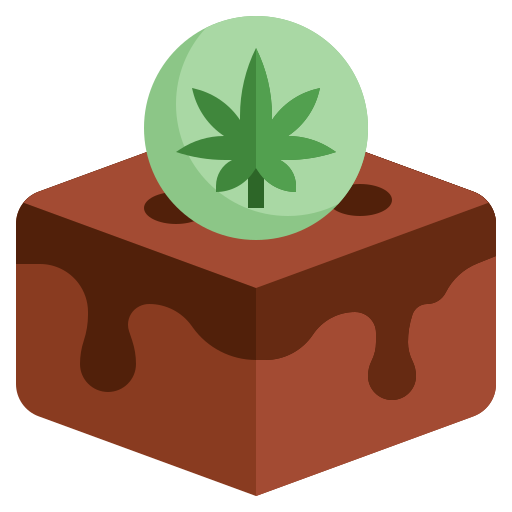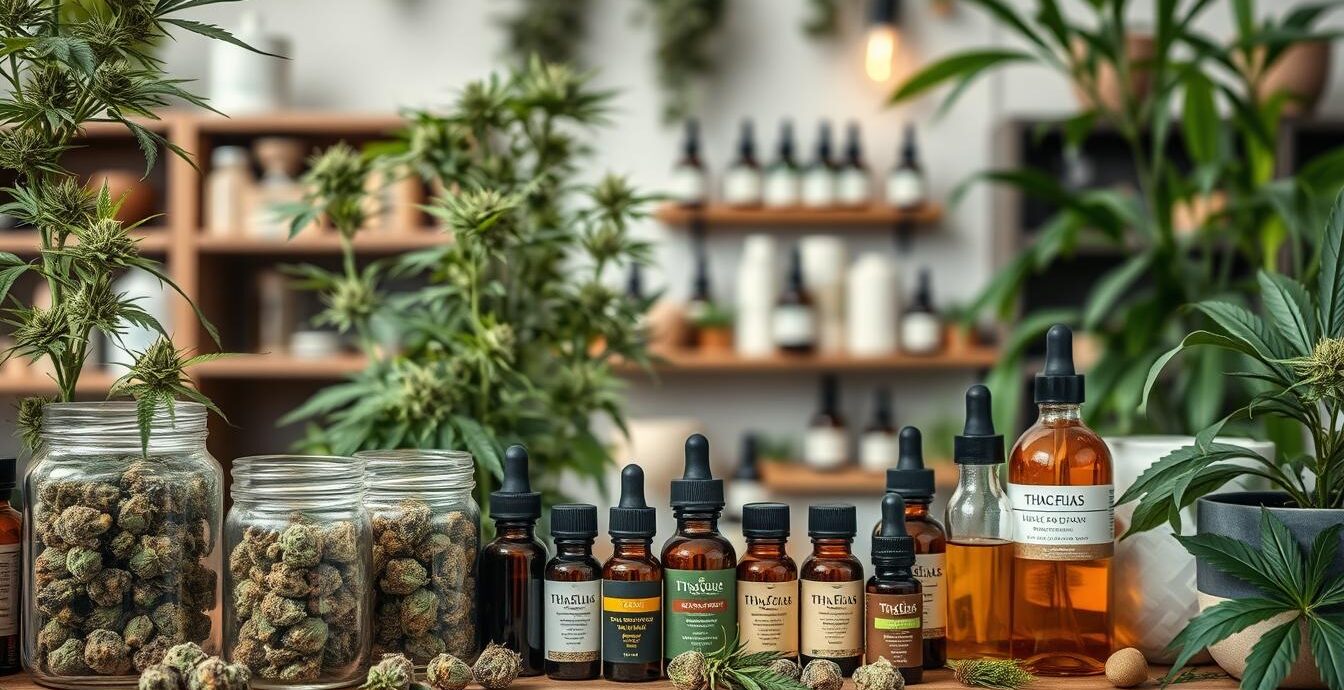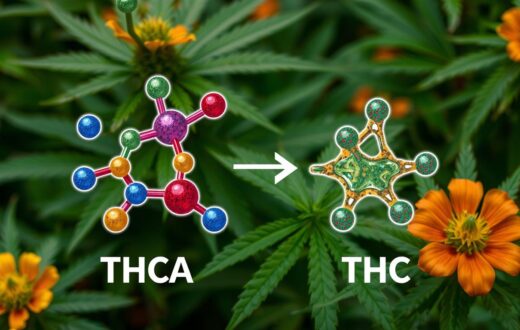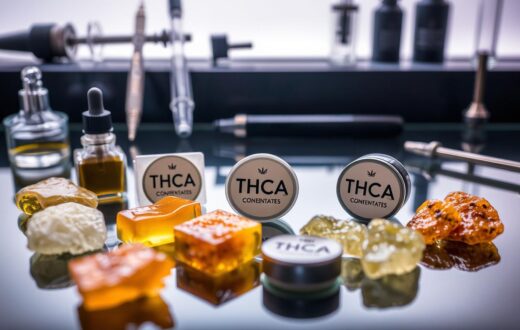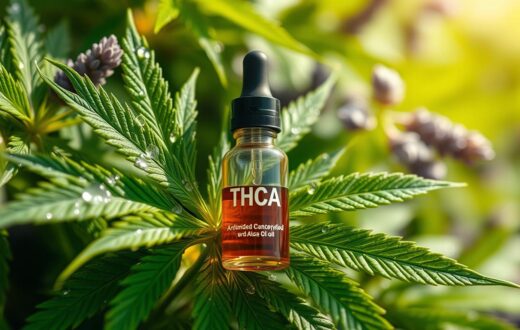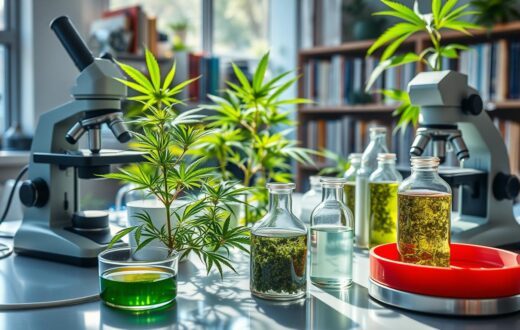Could a non-psychoactive compound in raw cannabis hold the key to groundbreaking medical treatments? Research into cannabinoids is growing, and THCA (tetrahydrocannabinolic acid) is showing promise. It’s a precursor to THC and is gaining interest for its potential benefits without the high.
THCA medical uses are getting more attention in healthcare. It’s being looked at for pain management and neuroprotection, among other uses. Unlike THC, THCA doesn’t cause psychoactive effects when raw, making it appealing for those seeking relief without feeling impaired.
There are over 500 known cannabinoids in the cannabis plant, and THCA is abundant in raw cannabis flowers. This has led to new ways to use it, like juicing raw cannabis to get THCA benefits. As we dive into THCA, we’ll see how it could change treatments for many conditions and why it’s a key area in cannabis research.
Understanding THCA: An Overview
THCA is a compound found in raw cannabis plants. It has caught the eye of medical researchers. This non-psychoactive cannabinoid might offer health benefits without the “high” from marijuana. Scientists are learning more about it through ongoing clinical trials.
What Is THCA?
THCA, or tetrahydrocannabinolic acid, is found in the trichomes of fresh cannabis. It’s different from THC because it doesn’t make you high. When heat is applied, THCA turns into THC, which is psychoactive.
How Is THCA Different from THC?
THCA and THC have different effects on the body. THC binds to brain receptors, causing euphoria and relaxation. But THCA doesn’t do this. This makes THCA interesting for medical research.
Studies show THCA might have anti-inflammatory properties. This could help treat conditions like arthritis and lupus. Researchers are looking into its benefits without the psychoactive effects of THC.
The Science Behind THCA’s Medicinal Properties
THCA, found in raw cannabis, has caught the attention of medical experts. This non-intoxicating compound might have many health benefits. Let’s explore the science behind THCA and its possible advantages.
Cannabinoids and the Endocannabinoid System
THCA is among over 100 cannabinoids in cannabis. It works with our body’s endocannabinoid system, which helps control many functions. Unlike THC, THCA doesn’t cause a high when it’s raw. This makes it appealing for those looking for medical benefits without the psychoactive effects.
THCA’s Role in Inflammation Reduction
Studies indicate THCA could reduce inflammation. This might help with conditions like arthritis and inflammatory bowel disease. Research on mice shows THCA could protect against Alzheimer’s disease. These discoveries suggest THCA might be useful in treating neurodegenerative diseases.
THCA also has antioxidant properties, which could protect cells. Some animal studies suggest it might help with nausea and seizures. While more research is needed, these early results are encouraging for THCA’s role in medicine.
Potential Therapeutic Applications of THCA
THCA is a non-psychoactive compound found in raw cannabis. It shows promise in various medical areas. This cannabinoid offers unique benefits without the mind-altering effects of THC. Let’s explore some key areas where THCA cannabinoid therapy is making waves in the medical field.
Pain Management
THCA is getting attention for pain management. Unlike THC, THCA doesn’t produce a high. This makes it an attractive option for those seeking relief without impairment.
Its anti-inflammatory properties may help reduce pain in conditions like arthritis and Crohn’s disease. Some patients report significant improvements in chronic pain when using THCA-rich products.
Neuroprotective Effects
Research suggests THCA may protect nerve cells. This could be a game-changer in treating conditions like Alzheimer’s or Parkinson’s. While more studies are needed, early results are promising for THCA cannabinoid therapy in brain health.
THCA also shows potential in managing nausea and vomiting. This is especially helpful for chemotherapy patients. Its ability to stimulate appetite without psychoactive effects makes it a valuable option in cancer treatment. As research continues, we may discover even more therapeutic applications for this versatile cannabinoid.
THCA and Cancer Research
Cancer research is very interested in THCA, a part of raw cannabis that doesn’t get you high. Scientists think it might help fight cancer. Early studies show it could be very promising.
Anti-Tumor Properties
Research on THCA and cancer is showing some amazing things. Lab tests suggest it could slow down some cancer cells. It might also help reduce inflammation and act as an antioxidant.
Impact on Cancer Cell Growth
Early studies suggest THCA could affect how cancer cells grow. Some research indicates it might stop cancer cells from spreading. But, we need more human trials to understand its full impact.
Many cancer patients use cannabis products to help with treatment side effects. As we learn more about THCA’s anti-tumor properties, it could be a new option for cancer care. But, it’s important to remember it’s not a cure. Always talk to your doctor before trying new treatments.
THCA for Chronic Conditions
THCA might help with chronic conditions like epilepsy and multiple sclerosis. It could offer relief without the high of THC. Let’s look into how THCA could aid those with these health challenges.
Use in Treating Epilepsy
Research on THCA for epilepsy is promising. It might have properties that help control seizures, like CBD. This could be a breakthrough for those with epilepsy.
THCA and Multiple Sclerosis
THCA might also help with multiple sclerosis. It could reduce inflammation and protect nerves. Early studies suggest it could slow disease progress and ease symptoms.
But, we need more research on THCA. It’s not proven yet. If you’re thinking about THCA for your condition, talk to your doctor. They can guide you based on your health.
Exploring THCA in Mental Health
Research on THCA in mental health is becoming more popular. This non-psychoactive compound in raw cannabis might offer relief without the high. Let’s explore how THCA could help with anxiety and depression.
Effects on Anxiety and Depression
Studies on THCA for anxiety and depression show promising results. Unlike THC, THCA doesn’t make you feel intoxicated. This makes it a good option for mental health support.
Some people say they feel calmer and more balanced after using THCA. Raw cannabis juices and tinctures are popular for these benefits.
Potential Use in PTSD
Research into THCA for PTSD treatment is ongoing. Its anti-inflammatory properties might help reduce brain stress. Some believe THCA could protect brain cells from PTSD damage.
While early results are encouraging, we need more studies. This will confirm if THCA is effective for PTSD symptoms.
As interest in THCA for mental health grows, it’s important to talk to healthcare providers. They can help with dosage and any interactions with other medicines. Remember, everyone reacts differently to cannabinoids like THCA.
How to Consume THCA
There are many ways to enjoy THCA. Let’s look at some popular methods for those interested in trying it.
Raw Cannabis Products
Raw cannabis is full of THCA. Fresh leaves and buds have lots of this compound. Many people juice raw cannabis to get THCA without turning it into THC.
THCA Extracts and Edibles
THCA extracts come in various forms. THCA sand is a favorite, known for its high purity. Some products, like Earthy Select’s THCa concentrates, have over 99.9% THCa purity.
These extracts can be dabbed, mixed into food, or used under the tongue. THCA sand users often start with 5-10 milligrams and adjust as needed.
Edibles with THCA are another choice. But, heating during cooking might change some THCA to THC. For those who prefer smoking, THCa pre-rolls with 20% to 30% total cannabinoids are available.
When using THCA products, effects can vary. Topical use may work in 15-30 minutes, while eating it can take 30 minutes to 2 hours. Always store THCA products in a cool, dark place to keep them potent.
Legal Status of THCA in the United States
The legal status of THCA in the U.S. is complex. The 2018 Farm Bill made hemp and its derivatives, like THCA, legal. This is if the total THC is less than 0.3% by dry weight. This change allowed THCA products in many states.
Federal Regulations
Under federal law, THCA is not a controlled substance. The hemp industry has grown, with more THCA products like oils and edibles. These items are legal if they meet the 0.3% THC limit.
State Law Variations
State laws on cannabis vary a lot. Some states allow THCA products, while others have stricter rules. California, Florida, and Texas allow THCA products that follow federal guidelines.
In contrast, Idaho, Louisiana, and Oregon ban THCA due to stricter THC rules. Ohio recently let adults 21 and older have up to 2.5 ounces of cannabis.
The legal status of THCA is always changing. It’s important for consumers to know their local laws on THCA and cannabis. As research grows and attitudes change, we might see more changes in THCA’s legal status nationwide.
Side Effects and Considerations
THCA is a non-psychoactive compound in raw cannabis. It has potential benefits but also side effects. These effects can vary from person to person.
Common Side Effects of THCA
THCA can make you feel drowsy, dry-mouthed, and slightly hungry. Some people might feel dizzy or nauseous. Long-term use, especially when smoked, could affect your brain.
It’s also important to know that THCA can show up in drug tests. This could lead to legal issues.
Interactions with Medications
THCA can change how your body handles certain medicines. This is especially true for people with health issues, pregnant women, the elderly, and teens. They might react differently to THCA.
If you’re thinking about using THCA for health problems like seizures or irritable bowel syndrome, talk to a doctor first. They can help you understand the risks and benefits. Remember, THCA might not work the same for everyone.
Understanding the Dosage of THCA
Finding the right thca dosage can be challenging. Many things affect how much you should take. Let’s look at the recommended amounts and what influences them.
Recommended Dosages for Medical Use
Begin with a small dose and gradually increase it. A good starting point is 1 to 2 milligrams of THCA. This method helps prevent unwanted side effects. Some people find relief with 50 mg of THCA, but it might be too strong for new users.
Factors Influencing Dosage
Your body weight, metabolism, and health condition impact your ideal THCA dosage. The quality and form of the product also matter. For instance, raw cannabis has different THCA levels than extracts.
Your tolerance also plays a role. Experienced users might need higher doses than beginners.
Remember, THCA turns into THC when heated. This change can cause psychoactive effects. If you’re using THCA for its non-psychoactive benefits, use raw or low-heat products.
Always consult a healthcare provider familiar with cannabis before starting any new regimen. They can help you find the right medical cannabis dosing for your needs.
Growing Interest in THCA Research
THCA research is becoming more popular in the scientific world. This non-psychoactive compound is found in raw cannabis plants. It’s being studied for its possible health benefits.
Scientists are looking into how THCA might help with inflammation, protect the brain, and ease nausea.
Current Studies on THCA
Recent studies are looking at THCA’s effects on health issues. Researchers are studying its impact on epilepsy. They’ve found it might help with some types of seizures.
They’re also checking if THCA can reduce inflammation. This could help with chronic conditions.
Future Research Directions
THCA research is set to grow even more. Scientists want to do more clinical trials to see if it’s safe and effective. They’re also interested in how it works with the body’s endocannabinoid system.
This could lead to new medicines based on THCA. As interest grows, researchers are looking into its use for neurodegenerative diseases and appetite control. THCA’s non-intoxicating nature makes it appealing for medical use, pushing for more research.
Patient Testimonials on THCA
THCA patient experiences give us a glimpse into its real-world effects. Many people have shared how THCA has helped them with various health issues.
Real-Life Experiences
Users of THCA flower have seen many positive results. Some find it helps with chronic pain and inflammation without the high. One person said, “THCA has changed how I manage my arthritis pain. I can move around better during the day without feeling high.”
Case Studies
Medical cannabis testimonials often talk about THCA’s benefits for specific conditions. A study on a patient with epilepsy showed a big drop in seizures with THCA. Another study found a patient with multiple sclerosis had better mobility and less muscle spasticity with THCA.
Even though these stories are encouraging, results can vary. We need more research to fully understand THCA’s benefits. As interest in THCA grows, we’ll likely see more studies and testimonials in the future.
The Role of Healthcare Providers in THCA Use
Healthcare providers are key in helping patients with THCA. As more people look into cannabis treatments, doctors need to know the latest. This lets them give the right advice during medical cannabis talks.
Consulting with Medical Professionals
Seeing a doctor is important when thinking about using THCA for health reasons. Doctors who know about cannabis can check your health and explain the good and bad of THCA. They also look at how it might mix with other medicines, making sure it’s safe.
Educating Patients on THCA
Teaching patients about THCA is a big job for doctors. They tell the difference between THCA and THC, saying THCA doesn’t get you high. They talk about how to use it, like in raw cannabis or extracts, and its effects. They also cover the legal side, since laws on cannabis change by state.
As studies on THCA keep coming, it’s important for doctors and patients to keep learning. This helps make smart choices about using THCA for health issues. By keeping current, doctors can guide those looking into THCA as a treatment.
Conclusion: The Future of THCA in Medicine
The future of THCA in medicine looks bright. Cannabis research is showing more interest in THCA’s potential. With over 140 cannabinoids found in cannabis, THCA is unique and promising.
Current Trends and Expectations
The medical world is getting more excited about THCA. It’s different from THC because it doesn’t make you high. Research shows it might help with inflammation and protect the brain.
These findings are making doctors think about using THCA more. They hope it will lead to new treatments.
The Need for Further Research
Even with promising signs, more research is needed. We need big studies to know how safe and effective THCA is. Right now, we don’t know how much THCA is safe to take.
As we learn more, THCA could change how we treat many health issues. It could be a big step forward in medicine.

